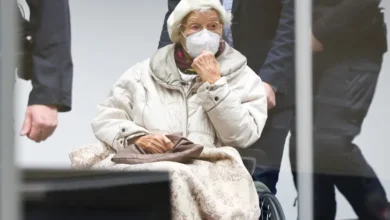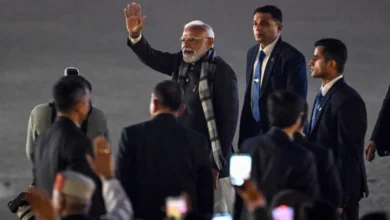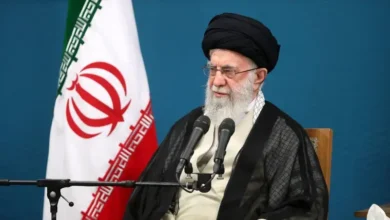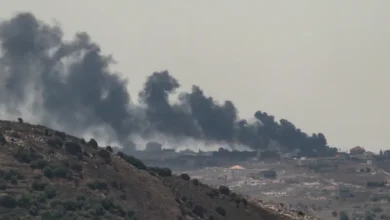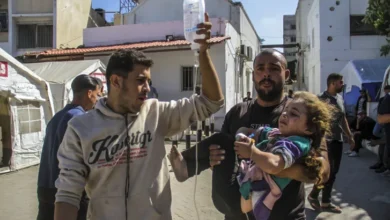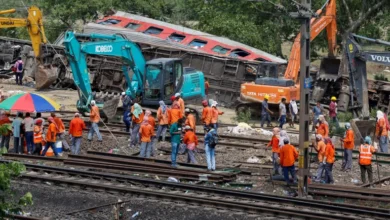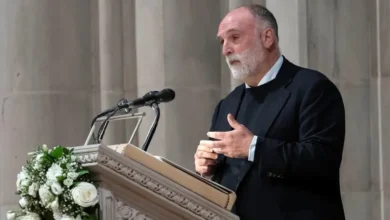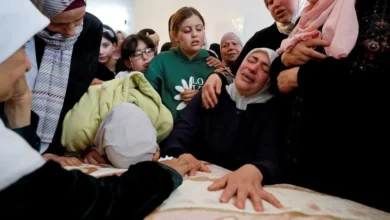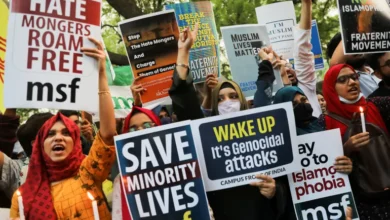Near Rafah border, baby dies and aid held up again as Israel’s war resumes
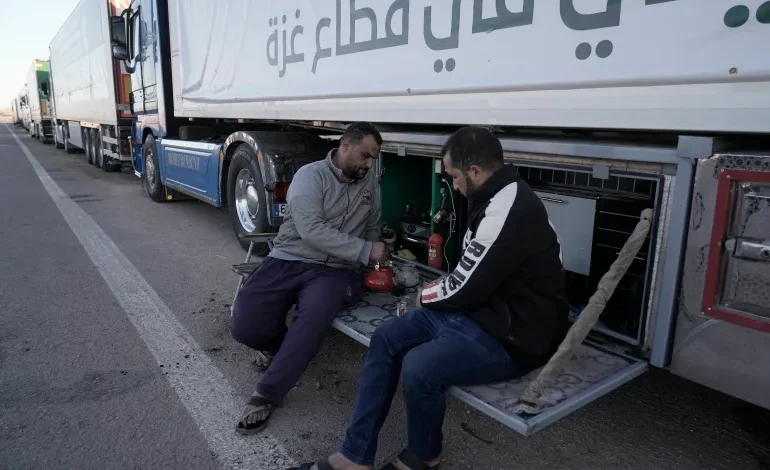
Hundreds of trucks carrying aid for Gaza were lined up in a long queue at the Egyptian side of the Rafah border crossing. Drivers and volunteers, many of them waiting for more than a week at the border, were having their lunches on carpets next to the trucks in the evening sunlight on Thursday.
A car passed by to sell bread and cigarettes. The border gate opened every now and then to let empty trucks through, returning from the Gaza Strip.
Truck driver Ahmed Naim Ibrahim has been one of the first in line. On Thursday, no trucks were let in, Ibrahim said, due to congestion on the other side of the border. After entering the Rafah crossing, trucks first have to drive 40km (24 miles) south along the border towards the Al-Owga crossing between Egypt and Israel, Ibrahim explained. There, the Israelis inspect the trucks, after which they return to Rafah. Only then can the trucks unload the aid that is being delivered to the Palestinian Red Crescent Society and the United Nations agency for Palestinian refugees, UNRWA.
From the moment a truck moves into the Rafah border crossing it takes two or three more days for the aid to be distributed in the Gaza Strip, Ibrahim said. “There is a line of 20km (12 miles) before the Israeli inspection,” he added.
Another driver, Saleh Ebada, agreed. “The inspection takes time, this is what causes the delay.” The trucks driven by Ebada and Ibrahim carry medicines, food, water, blankets and shrouds to cover the deceased.
“We are here because we want to support our brothers in Gaza,” said Hazem Mohamed, a volunteer for the Egyptian charity organisation Resala, which has 21 trucks waiting in line at the border. He is frustrated about the long wait. “Every day we are supposed to go in, but every time they postpone it to the next day,” he said. “But it is not in our hands. It is our duty to help, and the least we can do. Waiting for eight days is nothing compared to what those in Gaza are going through.”
Ibrahim and other drivers had hoped that they would be able to cross on Friday, but as the ceasefire ended, no trucks were let in. During the truce, the number of trucks entering the Rafah border increased from fewer than 100 to about 200 per day, but many of these are still stuck at the Israeli inspection. UN officials have said that, on average, 500 trucks used to enter the Strip daily before October 7, when Israel started its bombardment.
Trucks can be turned back to Egypt if the Israeli inspectors find “forbidden” things, drivers said. One, named Taha, said that for instance, small kitchen knives, scissors and gas canisters were not allowed. Israeli officials have said their checks are needed to ensure no weapons are being smuggled in for Hamas.
According to official numbers in Egypt, 8,691 foreign or dual nationals entered the country between November 1 and November 29, including the period of the truce.
In the same period, 389 wounded Palestinians and 328 other people accompanying them also arrived in Egypt. They are being treated in a field hospital near the border in Sheikh Zuweid and in hospitals in El Arish and other cities in Egypt.
Among the Palestinians allowed to leave Gaza were 28 premature babies who were in al-Shifa Hospital in Gaza City before it was taken over by Israeli forces. Of the 28 babies, 16 were first taken to El Arish General Hospital 45km (28 miles) from Rafah, while the remaining 12 were moved to Cairo.
But a doctor at El Arish hospital said on Thursday that one of the 16 babies at the facility had died. Six were taken to Cairo, while the remaining nine are in good condition. “They are healthy and growing,” the doctor said, who requested to remain anonymous as he was not the official spokesperson of the hospital.
Still, their future remains uncertain, as they are in Egypt without family. Many have no surviving direct family members, and it is unclear who, and where, their remaining relatives are, the doctor said. “Until we find them, they stay in the hospitals.”
One of the adult Palestinians treated in El Arish General Hospital is Rasha Elwan. Her legs were crushed by falling debris when an Israeli air strike hit her house in Khan Younis in the southern Gaza Strip.
She was taken to El Arish on November 21. “When I arrived here it was more comfortable. I am a little calmer here,” she said. Before being taken to El Arish, she was in Nasser hospital in the Gaza Strip. “In Gaza, the situation is disastrous. It was very difficult, there were a lot of wounded in the hospital. The doctors did not have time for all of us.”
In El Arish she underwent an operation, and doctors told her she might need another one. “Maybe I have to stay another two weeks in the hospital here, and afterwards I could go to Cairo to continue treatment,” she said. She hopes to stay in Egypt, but her family is still in Gaza. “My son died, and my husband is in a hospital in Gaza, he did not come here yet.”
Doctors at the hospital said that once the wounded are released, the diplomats from the mission of the Palestinian Authority in Egypt take care of them. There is a place in El Arish where the recovered Palestinians can stay for at least as long as the fighting continues. No one has been returned to Gaza, one doctor said, “only those who died”.
It is unclear what would happen to the wounded Palestinians in Egypt, and whether Elwan could stay in Egypt, if the fighting in Gaza were to stop.
